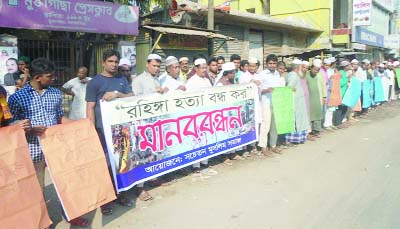
BSS, Rajshahi :
Speakers at a village-level public dialogue here voiced for time-befitting and effective measures for conservation of both biodiversity and cultural diversity in the vast Barind tract yesterday .
They mentioned that the diversities are gradually declining now due to various natural and man-made catastrophes posing a serious threat to the whole ecosystem. So, there should be a campaign and state-level interventions.
Bangladesh Resource Center for Indigenous Knowledge (BARCIK) and Bilnepalpara Farmers Club jointly organised the dialogue titled “Environment Protection and Conservation and expansion of Local Sports” on Bilnepalpara School premises under Paba upazila of the district on Friday.
“Mainstreaming Biodiversity, Sustaining People and their Livelihoods” was the main theme of the discussion.
Ayen Uddin, MP, said, while addressing the meeting as the chief guest, collective efforts of all government and non-government organisations concerned is very much important to protect and conserve the biodiversity.
With the club president Anwarul Islam in the chair, College teacher Golam Masud, school teachers Ruhul Amin Siddiqui and Md Ashrafuzzaman and farmers Abdur Rahim and Nurul Amin also spoke.
Shahidul Islam, regional coordinator of BARCIK, said school, college and university level students need proper knowledge about the importance of biodiversity, natural resource conservation and climate change issues so that they can contribute to this field.
To this end, there should be time-befitting measures and institutional learning for them as there is no way but to natural resource conservation in the region to face the adverse impact of climate change for the greater interests of new and future generation.
In the wake of abnormal declining of natural resources like native crop seeds, fish and birds species and other wildlife, conservation of natural resources has become indispensable for facing the adverse impacts of climate change.
Obviously, we have to devise ways and means on how to cope with the adverse impact of climate change. Integrated approach has become an urgent need to mitigate the adverse impact, he said.
He opined that many native crops and vegetable varieties are gradually
declining. The native fish species, particularly the small indigenous ones are on the verge of extinction due to various reasons.
Time has come to build wider network among the educational institutions creating platform for open dialogue to initiate regional research programmes on regional problems and solution. Importance should be given to capacity building to address climate change in the region with special reference to conservation of drought tolerant species.
Speakers at a village-level public dialogue here voiced for time-befitting and effective measures for conservation of both biodiversity and cultural diversity in the vast Barind tract yesterday .
They mentioned that the diversities are gradually declining now due to various natural and man-made catastrophes posing a serious threat to the whole ecosystem. So, there should be a campaign and state-level interventions.
Bangladesh Resource Center for Indigenous Knowledge (BARCIK) and Bilnepalpara Farmers Club jointly organised the dialogue titled “Environment Protection and Conservation and expansion of Local Sports” on Bilnepalpara School premises under Paba upazila of the district on Friday.
“Mainstreaming Biodiversity, Sustaining People and their Livelihoods” was the main theme of the discussion.
Ayen Uddin, MP, said, while addressing the meeting as the chief guest, collective efforts of all government and non-government organisations concerned is very much important to protect and conserve the biodiversity.
With the club president Anwarul Islam in the chair, College teacher Golam Masud, school teachers Ruhul Amin Siddiqui and Md Ashrafuzzaman and farmers Abdur Rahim and Nurul Amin also spoke.
Shahidul Islam, regional coordinator of BARCIK, said school, college and university level students need proper knowledge about the importance of biodiversity, natural resource conservation and climate change issues so that they can contribute to this field.
To this end, there should be time-befitting measures and institutional learning for them as there is no way but to natural resource conservation in the region to face the adverse impact of climate change for the greater interests of new and future generation.
In the wake of abnormal declining of natural resources like native crop seeds, fish and birds species and other wildlife, conservation of natural resources has become indispensable for facing the adverse impacts of climate change.
Obviously, we have to devise ways and means on how to cope with the adverse impact of climate change. Integrated approach has become an urgent need to mitigate the adverse impact, he said.
He opined that many native crops and vegetable varieties are gradually
declining. The native fish species, particularly the small indigenous ones are on the verge of extinction due to various reasons.
Time has come to build wider network among the educational institutions creating platform for open dialogue to initiate regional research programmes on regional problems and solution. Importance should be given to capacity building to address climate change in the region with special reference to conservation of drought tolerant species.

